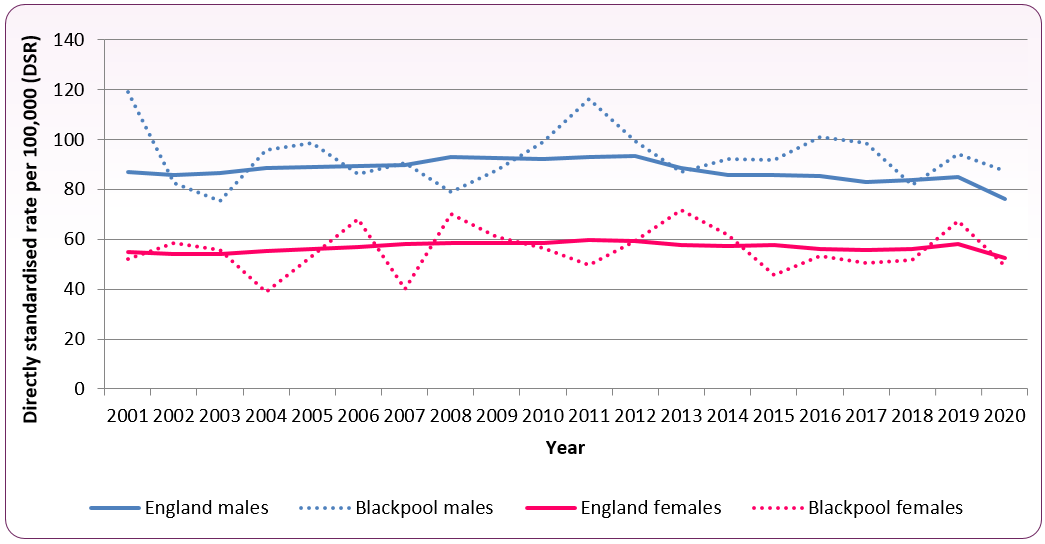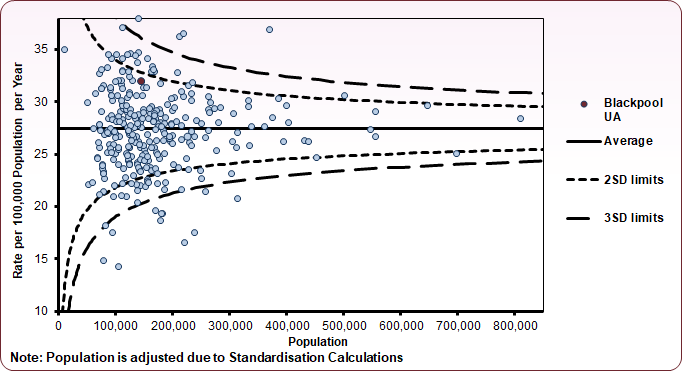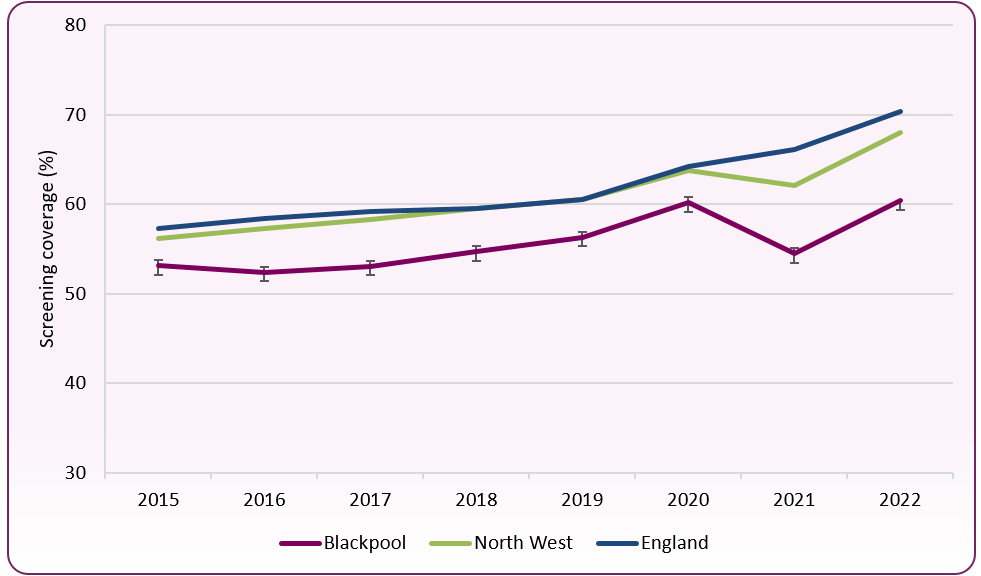Colorectal Cancer
Last Modified 05/12/2023 10:34:40
Share this page
Introduction
Cancer Research UK provides a brief guide to colorectal (bowel) cancer that includes information about symptoms, early detection, screening and possible risk factors.
Facts and figures
Incidence of colorectal cancer
Incidence is defined as the number of new cases identified in a given period of time.
In Blackpool each year there are approximately 103 new cases of colorectal cancer identified.1 Figure 1 shows the trend in the cancer incidence rate for the Blackpool sub-location (formerly NHS Blackpool clinical commissioning group) and England. The incidence rate (in this case per 100,000 population) is calculated to allow comparison between geographies of different population sizes and with different gender and age make ups.
Colorectal cancer incidence is statistically similar in Blackpool compared to England for males and females (all ages).
Figure 1 - incidence of colorectal cancer - 2001-2020 annual trend
 Source: Cancer data NHS Digital
Source: Cancer data NHS Digital
Mortality from colorectal cancer
Each year in Blackpool there are approximately 48 deaths due to colorectal cancer. The directly standardised mortality rate (in this case per 100,000 population) is calculated to allow comparison between geographies of different population sizes and with different gender and age make ups. Figure 2 demonstrates that mortality rates for colorectal cancer in Blackpool are higher than the national average.
Please note, the mortality funnel chart below cannot be updated to incorporate more recent data at present. This is due to the revised official population estimates (based on the Census 2021) not being available. Once these are published, the chart will be updated.
Figure 2 - mortality from colorectal cancer - 2018-2020 - lower tier local authorities
 Source: NHS Digital, Compendium: Mortality, 2021
Source: NHS Digital, Compendium: Mortality, 2021
Colorectal cancer survival rates
Cancer survival rates are estimates of the percentage of people still alive after a specific amount of time following a diagnosis. It usually only refers to primary cancers and does not include secondary cancers or recurrences.
The one-year colorectal cancer survival rate for England has increased steadily since 2005. However, the survival rate for the Blackpool sub-location area has fallen over this period. In 2020, the survival rate for colorectal cancer in Blackpool was 71.4%, compared to a high of 74.1% in 2009. Across England the one-year survival rate in 2020 was 80.5%.
The NHS administers a national bowel screening programme aimed at detecting early symptoms of bowel cancer. Improvements in bowel cancer screening coverage would mean more bowel cancers are detected at more treatable stages, and more polyps would be detected and removed, reducing the risk of bowel cancer developing. The definition of the bowel cancer screening coverage measure is the proportion of people resident in the Blackpool area (determined by postcode of residence) aged 60-74-years, eligible for bowel cancer screening (screened adequately within the previous 2.5 years).
In 2021 (during COVID-19), screening levels fell in Blackpool and across the North West, though the England average rose slightly. In 2021, Blackpool's rate was 54.7% compared to 65.2% across England. Although Blackpool achieved an increased screening coverage rate of 60.4% in 2022, it is still significantly lower than England (70.3%)(figure 3).
Figure 3 - bowel cancer screening coverage - 2015-2022 annual trend
 Source: Public health profiles - OHID
Source: Public health profiles - OHID
National and local strategies (current best practices)
-
- National Institute for Health and Care Exellence (NICE) provide guidance, advice, NICE Pathways and quality standards on colorectal cancer
Risk factors
Cancer Research UK has compiled a summary of risk factors and causes of colorectal cancer.
Colorectal cancer definition here includes malignant neoplasm of colon and rectum / rectosigmoid junction (ICD10 C18-C20 categories) but not of small intestine or anus. Mortality data includes both cancers of small intestine and anus.